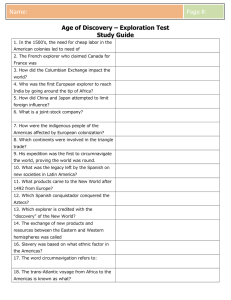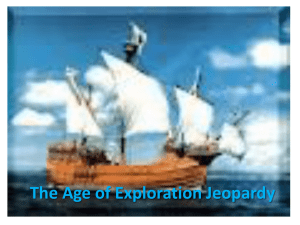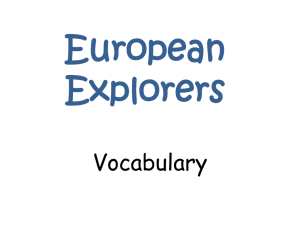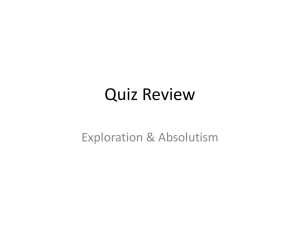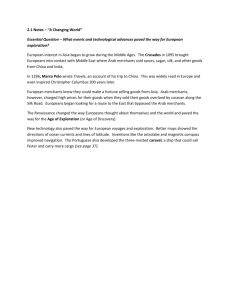Chapter 2 Study Guide (2.1, 2.2, 2.3, & 2.4)
advertisement
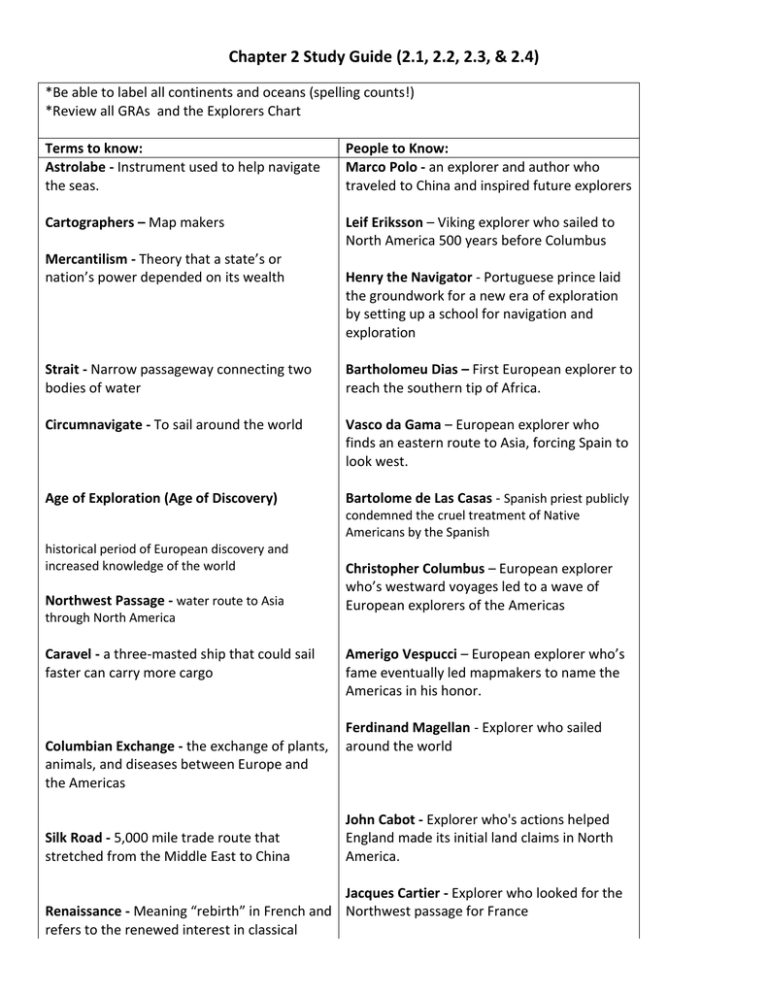
Chapter 2 Study Guide (2.1, 2.2, 2.3, & 2.4) *Be able to label all continents and oceans (spelling counts!) *Review all GRAs and the Explorers Chart Terms to know: Astrolabe - Instrument used to help navigate the seas. People to Know: Marco Polo - an explorer and author who traveled to China and inspired future explorers Cartographers – Map makers Leif Eriksson – Viking explorer who sailed to North America 500 years before Columbus Mercantilism - Theory that a state’s or nation’s power depended on its wealth Henry the Navigator - Portuguese prince laid the groundwork for a new era of exploration by setting up a school for navigation and exploration Strait - Narrow passageway connecting two bodies of water Bartholomeu Dias – First European explorer to reach the southern tip of Africa. Circumnavigate - To sail around the world Vasco da Gama – European explorer who finds an eastern route to Asia, forcing Spain to look west. Age of Exploration (Age of Discovery) Bartolome de Las Casas - Spanish priest publicly condemned the cruel treatment of Native Americans by the Spanish historical period of European discovery and increased knowledge of the world Northwest Passage - water route to Asia through North America Caravel - a three-masted ship that could sail faster can carry more cargo Columbian Exchange - the exchange of plants, animals, and diseases between Europe and the Americas Silk Road - 5,000 mile trade route that stretched from the Middle East to China Christopher Columbus – European explorer who’s westward voyages led to a wave of European explorers of the Americas Amerigo Vespucci – European explorer who’s fame eventually led mapmakers to name the Americas in his honor. Ferdinand Magellan - Explorer who sailed around the world John Cabot - Explorer who's actions helped England made its initial land claims in North America. Jacques Cartier - Explorer who looked for the Renaissance - Meaning “rebirth” in French and Northwest passage for France refers to the renewed interest in classical Greek and Roman learning. Cape of Good Hope - Southern Tip of Africa Henry Hudson - Explorer who looked for the Northwest passage for England Conquistador - Spanish Conqueror Bartolome de Las Casas - priest who spoke out against the poor treatment of native Americans. New Amsterdam - city founded by Dutch explorers; later becomes New York City Hernan Cortes - Famous conquistador who conquered the Aztec Empire Essential Questions: 2.1 – What events and technological advances paved the way for European exploration? The Renaissance High Taxes on the Silk Road Marco Polo's Travels Development of the Astrolabe Development of the Compass Improved cartography Prince Henry’s School of Navigation 2.2 – Why did Spain and Portugal want to find a sea route to Asia? To seek trade routes To spread religious faith To increase political and economic influence 2.3 – How did Spain’s conquests affect the economic and social development of the Americas? Europeans established colonies in North America. Millions of Native Americans die from disease. Enslaved Africans arrive in the Americas. Animals, Foods from the Americas are introduced in Europe. 2.4 – Why did European nations establish colonies in North America? To provide resources and trading ports To spread religious faith To increase political and economic influence
